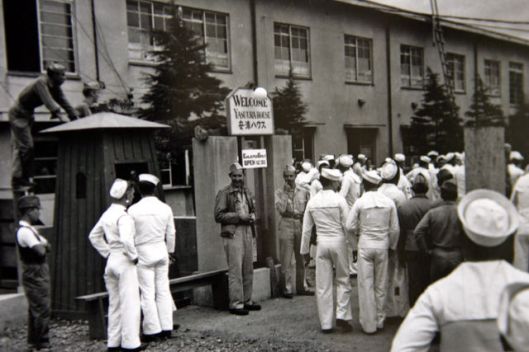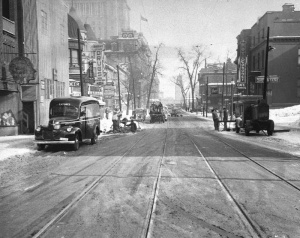Tags
1946, amateur sleuth, bigotry, book review, dispossession, historical fiction, information dumps, internment camps, Japanese Americans, Los Angeles, murder, mystery, Naomi Hirahara, newlyweds, PTSD, veterans
Review: Evergreen, by Naomi Hirahara
Soho, 2023. 280 pp. $28
It’s 1946, and Aki Nakasone and her family have finally been permitted to return to Los Angeles after their imprisonment at Manzanar internment camp and forced relocation to Chicago. But nothing’s the same in LA. Like other Japanese Americans, they’ve lost jobs, property, and their home and have little left except pride, endurance, and determination.

Pettit’s Studio photograph of downtown Los Angeles, 1946 (courtesy Pettit’s Studio via Wikimedia Commons; public domain)
Aki has one thing to look forward to, however: the return of her husband, Art, from army service in Europe. Married just before he shipped out, the couple has spent almost no time together. They’re essentially newlyweds, and Aki can’t wait to start their lives together.
But Art’s return brings her no joy. He’s moody, withdrawn, tells her nothing. And Aki, who feels overwhelmed by marriage and has been taught to submit to her husband’s wishes, hesitates to ask the questions that might ease her mind and reestablish the rapport they once had.
A flashpoint between them is Art’s best man at their wedding and former comrade-in-arms, Babe Watanabe. Aki has always thought him irresponsible, even immoral, and when Babe’s father shows up with strange bruises at the hospital where she works as a nurse’s aide, she suspects physical abuse. So when Mr. Watanabe is murdered in a seedy residential hotel in the neighborhood known as Little Tokyo, Aki worries that Babe’s the killer. A son murdering a father? Unthinkable, yet . . . .
But she can’t say a word against him in Art’s hearing, partly because she rarely sees her husband anymore. He’s been spending his evenings supposedly chasing down stories for the Little Tokyo newspaper that has hired him as a part-time reporter but has also been socializing with his colleagues, among whom Aki feels outclassed and unsophisticated. She wonders whether she knows Art anymore.
As you have probably figured out, she takes halting steps to solve the murder, unsure of herself at almost every turn, which I like. The story moves quickly, if not always smoothly, and the author keeps you guessing the solution until the end. She re-creates the gritty, sometimes hand-to-mouth circumstances forced on Japanese Americans and the bigotry they face daily. I particularly like the premise, which places insecure Aki struggling to solve the mystery that’s her marriage, that of the crimes affecting people she knows, and how the two puzzles intersect.
Hirahara offers occasional glimpses into social attitudes I’d never heard of and wouldn’t have anticipated, as when Aki recalls the suffering at Manzanar:
We had lined up for our inoculations, almost like cattle and sheep. . . . Rumors flew fast and furious. The government was poisoning us with these shots, many claimed. But often our camp-wide digestive problems could be traced to food that was left out too long before being cooked and served.
But despite these virtues, Evergreen leaves me unsatisfied. The male characters are flat, having one or two salient qualities, and that’s it. The narrative explains Art and records his behavior but doesn’t suggest his inner life, or even that he has one. (And for all his symptoms of post-traumatic stress, I don’t believe he ever saw combat. It doesn’t live inside him in any other way.) The couple never grapples with their problems, and as a consequence, the resolution feels hollow and anticlimactic. Just a finger snap, and life’s good again.
Much of the information imparted about the internment, dispossession, and bigotry reads like information dumps. Some scenes seem to have no other purpose than to teach this sadly neglected history. Maybe too Hirahara would have done better to explore one issue in depth rather than drag in, say, the Ku Klux Klan.
I thought Amy Chua did a more cohesive and powerful job integrating the history into her novel, The Golden Gate. But neither author thought to link the persecution and dispossession of Japanese Americans to German concentration camps, which I find startling. And Hirahara has a perfect segue; after all, Art fought in Europe.
Finally, her narrative style gets on my nerves. At one point, Aki hears of a badass named Ox and thinks, “Obviously not his given name.” Later, she gives someone a penicillin shot and observes that the drug would reduce the chances of infection. You don’t say!
I’m not sure what to think when—no exaggeration—an author plays Captain Obvious on every page. Is she a pedant, unaware she’s talking down to her readers, and her editor goes along? Or do most readers want everything spelled out, no inferences necessary, and I’m the outlier here?
Granted, Hirahara’s not writing literary fiction. But even so, Evergreen goes to ridiculous lengths to connect every dot. And if Aki has to explain each conclusion she draws, that makes her seem none too clever, hardly the type to solve a crime.
Too bad this novel doesn’t live up to its premise.
Disclaimer: I obtained my reading copy of this book from the public library.









